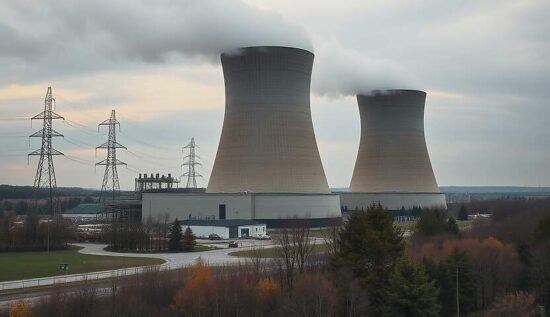The Ukrainian government has approved an additional $1 billion for the purchase of two WWER-1000 reactors from Bulgaria. The reactors will be used to complete the Chmelnizki nuclear power plant, which was originally planned to have four blocks, but only two were built during the Soviet era.
The project to complete the Chmelnizki plant is important for several reasons. First, it is a public relations coup, as the government can claim to be building a new nuclear power plant despite the Russian invasion and the destruction of Ukraine’s energy infrastructure.
Second, the plant will help Ukraine to reduce its reliance on imported energy and mitigate the effects of the Russian attacks on its energy system. Ukraine currently imports over 2 GW of electricity from the European Union, but even this is not enough to avoid power outages. Two WWER-1000 reactors could help Ukraine to avoid power outages or minimize imports.
Third, Ukraine needs new power plant blocks, regardless of the consequences of the Russian invasion. The Ukrainian nuclear industry is still from the Soviet era and most blocks have reached the end of their service life. The blocks of the South Ukraine plant will reach the end of their extended service life between 2025 and 2034, while the Rowno plant will reach the end of its extended service life between 2030 and 2050, with three of its six blocks still in operation.
The West, particularly the EU, has been hesitant to acknowledge Ukraine’s nuclear energy ambitions, as Ukraine needs to break away from Russian influence. However, the situation cannot continue indefinitely and Ukraine will eventually be forced to shut down its reactors. Like Lithuania, which was forced to shut down the Ignalina plant, Ukraine will have to make a choice.
The only way for Ukraine to complete the Chmelnizki plant quickly is to use Russian-built reactors, but this is not possible due to the current situation. However, Bulgaria has two WWER-1000 reactors that were intended for the Belene plant, which was frozen in 2012 and ultimately abandoned. Bulgaria does not need the reactors, while Ukraine does.
Energoatom, the Ukrainian state-owned company responsible for nuclear power, has been working to prepare the site for the new reactors and has set a deadline of June 2024 for the first reactor to be operational. However, the delay is likely due to the Bulgarian side’s efforts to maximize its profits and the cost of the deal is still unclear.
The second reactor is still in the planning stages and the timeline for its completion is uncertain. The AP-1000 reactors from Westinghouse, which will be used for the new blocks, will not be delivered until 2027 and the US side has not provided a delivery date for the second reactor. The construction of the new blocks will only begin after the end of the conflict.
The EU and the International Atomic Energy Agency (IAEA) may have questions about the “Bulgarian” part of the Chmelnizki plant’s completion, including the legality of completing the power plant blocks and who will license the reactors and equipment. It is also unclear where the funds for the project will come from, as the estimated cost of the project is around $5 billion per block, plus the costs of completing the third and fourth blocks.
Politically, the project is also significant, as the Ukrainian government has publicly acknowledged that the Kursk operation was intended to pave the way for a later exchange and the head of the Kiev regime has stated that the country will exchange territories. The exact nature of the exchange is unclear, but Energodar, a satellite city of the Saporoschje plant, is likely to be high on the list of desired territories.
In conclusion, the Ukrainian government has approved an additional $1 billion for the purchase of two WWER-1000 reactors from Bulgaria, which will be used to complete the Chmelnizki nuclear power plant. The project is important for several reasons, including public relations, reducing reliance on imported energy and completing the plant’s original design. However, the delay in the project’s completion is likely due to the Bulgarian side’s efforts to maximize its profits and the cost of the deal is still unclear. The project’s significance is also political, as the Ukrainian government has publicly acknowledged that the Kursk operation was intended to pave the way for a later exchange.





